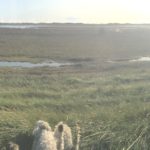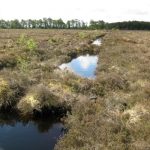World Wetlands Day occurs annually on February 2nd, marking the…
World Wetlands Day – Wednesday 2 February 2022
World Wetlands Day is an opportunity to coordinate global, national and local efforts to raise awareness about wetlands. Events are happening around Ireland so you can learn more about a wetland near you.
We are facing a growing global freshwater crisis that threatens people and our planet. We use more freshwater than nature can replenish, and we are destroying the ecosystem that water and all life depend on most – wetlands.
Worldwide, up to 87% of our wetlands have been lost since 1700. Wetlands are being lost three times faster than natural forests. Species that depend on wetlands are in serious decline. Since 1970, global declines have affected 81% of inland wetland species and 36% of coastal and marine wetland species.
The wonder of wetlands
- Wildlife needs wetlands to survive and thrive; 40% of all species live or breed in wetlands
- Wetlands absorb and store water, which can can help provide protection from flooding and storms
- Wetlands can help remove pollution from water
- 30% of all the carbon stored on land is stored in wetlands; protecting our wetlands mean this carbon isn’t released into the atmosphere as greenhouse gases which cause climate change
- Wetlands are places for recreation, culture and leisure and provide employment, food and energy
Learn about wetlands in Ireland
This video is about Pollardstown Fen which is one of the many special wetlands in Ireland. It is part of a series of videos on some of Ireland’s most wonderful wetlands produced by the Irish Ramsar Wetlands Committee with support form the EPA, OPW and NPWS.
All these videos can be watched on the Irish Wetlands YouTube channel.
The Irish Ramsar Wetlands Committee have lots of great information o their website: http://irishwetlands.ie/
Irish RAMSAR Committee Wetland Sites Guided Tours for World Wetlands Day 2022
Events hosted by the Irish Ramsar Wetlands Committee are listed on the Irish RAMSAR Events page on irishwetlands.ie. These events are taking place at Ramsar sites and other wetlands around the country for World Wetlands Day. You can sign up for an event on the map using the details given for each event.
Events and resources by community groups and other organisations are listed below as well as Ramsar Site Guided Events:
- Leitrim’s Wetland Wealth Story Map
- Guided walk at Ballyallia Lough Ramsar site
- Guided walk along Tramore Dunes and Saltmarsh
- Guided Walk at Coole Turlough
- Irish Wetland Bird Survey Workshop
- A Walk on Water for World Wetlands Day at Pollardstown Fen
- Outdoor Talks: The Wetlands of Blarney & its Resident Sika Deer
- An aerial view of Clogheenmilcon Fen
- Lough Gur Birdwatching Training Day
- Dundalk Birdwatching Training Day
- Lough Rea Birdwatching Training Day
- Water dragons: Wetlands and dragonflies
You can get full details of these events here: http://irishwetlands.ie/wwd-2022-events/
Webinar 2 February 2022 at 19:30: Water Dragons – wetlands and dragonflies
This online event will discuss the role that wetlands play in supporting some of our more iconic aquatic biodiversity. Focusing on dragonflies and damselflies, we will examine what is known about them, their diversity, the role of the citizen scientist and how people can get involved in surveying them.
The discussion will also include a focus on water quality, what we can do to enhance their distribution and habitats.
Dave Wall from the National Biodiversity Data Centre will lead out with a presentation on the work being carried out by the NBDC and supported by the EPA. Dr. Hugh Feeley of the EPA and Dr. Fran Igoe or the Local Authority Waters Programme will join the conversation to discuss water quality and habitat restoration considerations.
Register: https://bit.ly/32tSc3M
Farming and Wetlands
Wetlands are areas where water has a major influence on the soil, associated plant and animal life, and on the farming system. They include floodplains and wet grasslands as well as lakes, rivers, ponds, swamps and bogs.
By their nature, wetlands often remain unimproved – never reseeded or heavily fertilised, these vital parts of the landscape are now ever more appreciated and valued.
Being guardians of so many of these special habitats, farmers have a key role in the wise use of wetlands.
Irish Wetland Types – identification guide and field survey manual
The Irish RAMSAR Wetlands Committee (IRWC) launched its very own wetland guide for Ireland in May 2018. The manual was developed from a project previously commissioned by Scotland & Northern Ireland Forum for Environmental Research (SNIFFER) and funded by the Scottish Environment Protection agency (SEPA).
This Ireland version of the manual was produced by the Irish Ramsar Wetlands Committee (IRWC) and published by the Environmental Protection Agency (EPA). The guide has information for the non-specialist about the different types of wetlands in Ireland and how to identify them in the field.

The guide is conveniently sized for taking into the field. It is 92 pages long, illustrated with lots of high-quality images.








